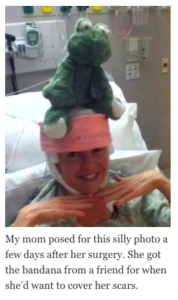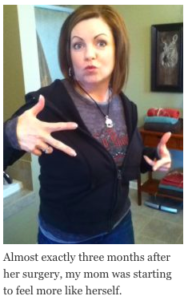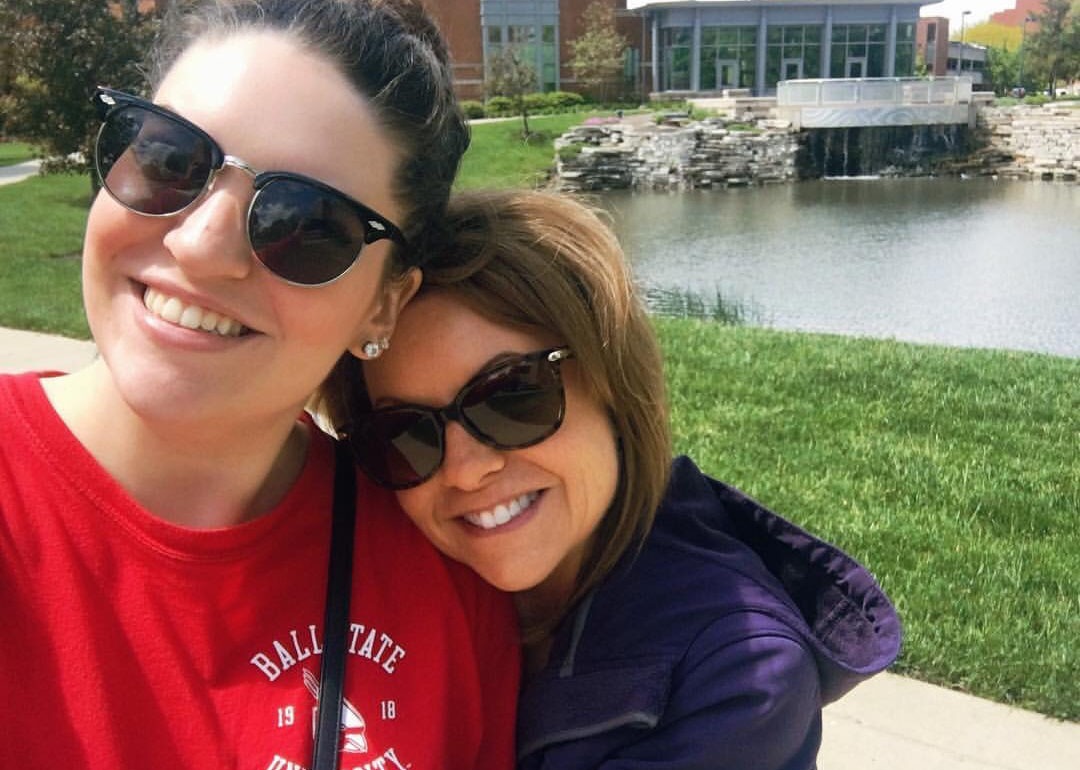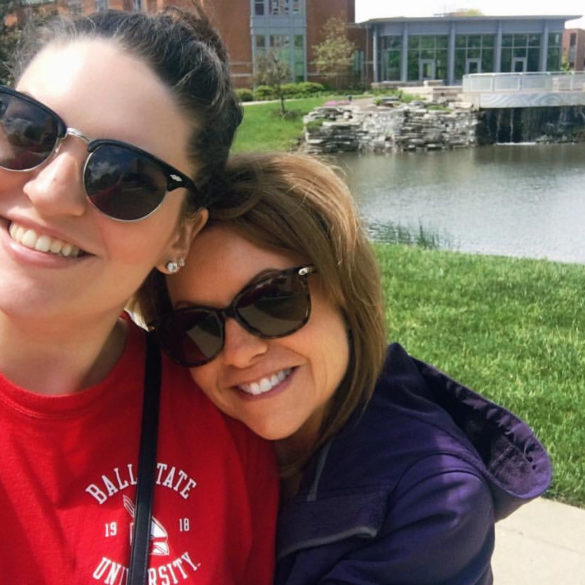In the days following my mother’s brain aneurysm, I faced a possible future of growing up without her.
One January morning in my sophomore year of high school, my mom collapsed while working out, hitting her head and knee on the way down. Afterward, she had a headache. Her face was pale. She decided to go to the hospital on the recommendation of my aunt, who was a nurse.
It was precautionary, but the idea left a sick feeling in my stomach.
The whole day, I had trouble concentrating. I checked my phone every 15 minutes for updates, but nothing came.
My dad and his girlfriend, Monique, drove into town to pick up my sister and me from school that day. We had dinner at a Red Lobster across the street from the hospital. Dad and Monique made the occasion seem almost normal, until my dad got a call from my uncle. That was not normal.
We finished our dinner and drove to the hospital. Before going in, we paused to sit in the parked car, worried faces illuminated by the dome light.
Dad broke the silence, attempting to give us the news, but immediately choked up. Monique took over. The doctors had been doing tests all day, concluding that Mom had a ruptured brain aneurysm.
So is she gonna die? my sister, Sydney, asked. We knew it couldn’t be good. Neither one of us could name someone we knew who survived or fully recovered from an aneurysm.
I was too stunned to speak.
We entered the hospital and filed into my mom’s room. She had tubes stuck in her arms and was hooked up to a heart monitor. She smiled and motioned for us to sit at the end of her bed. She took our hands and told us things weren’t looking great. There was a very good chance she might die. She tried to reassure us that we would both be fine.
You’ll both keep on going, she told us. I wouldn’t want your lives to end just because I die.
Sydney and I both sobbed as Mom held our hands.
That night, a helicopter transferred Mom from Rockford, Illinois, to a hospital in Madison, Wisconsin. Dad, Monique, Sydney, and I followed by car.
That was the first of many trips Sydney and I took to Madison that winter, but that wasn’t the first time I was aware of my mom’s mortality.
My mom’s mother had died a little over a year before I was born, and her father died when I was only a few weeks old. I grew up knowing that, and my young mind could never wrap around how terrible that must have been.
For whatever reason, I had this nagging feeling that, because my mom’s parents died young, she would, too. I imagined a parent’s death to be a life-shattering event, as in Mufasa’s death in The Lion King.
I was an anxious child, often becoming fixated on things that could possibly go wrong. One night in particular, around the age of 8, I slid out of bed and crept downstairs.
I was thinking about when you die, I told Mom, tears streaming down my face.
She held me and told me she wouldn’t die for a long, long time. When she did, though, I would be strong enough to keep going.
That night, I fell asleep on my mom’s side of my parents’ bed, watching the digital clock tick further and further past my bedtime. It didn’t matter to me how long it’d be before my mom died. I already knew it would be terrible. I knew there wouldn’t be a day that I wouldn’t need her.
On my mother’s first day in Madison’s neurology ICU, two doctors gave her treatment options. I preferred the non-surgical route.
A few years before, I had opted out of watching a video of a brain surgery for my sixth-grade health class. My mom told me then that she would have been just as squeamish as I had been. I would honestly rather die, she had told me.
Four years later, she chose the surgery to repair the aneurysm. When it came down to it, not dying was the better option.
 The doctors had told us that the first 48 hours after surgery would be the most dangerous. Strokes or seizures were more likely. I remember spending most of those days feeling like I’d look over and see her eyes rolling back in her head or her body flopping all over the bed, but it never happened.
The doctors had told us that the first 48 hours after surgery would be the most dangerous. Strokes or seizures were more likely. I remember spending most of those days feeling like I’d look over and see her eyes rolling back in her head or her body flopping all over the bed, but it never happened.
I was constantly haunted by the thought of my mom’s skull open on an operating table. Every time she got up for a walk around the ICU, clinging to the IV pole, I fixated on how difficult it was for her to move. My mother, athletic and brave, was lying broken in a hospital room.
Everyone kept saying how strong she was, but I had seen her stronger. She’d kept me going through the low points of my anxiety and depression. She lost her own parents before I was able to know them. She was my and Sydney’s rock through years of bullying, mood swings, and boy problems. But somehow, it was the brain aneurysm that took her down.
I spent my days at school in a trance and my afternoons in the hospital writing and listening to sad songs while my mom tried to sleep. I played “The Scientist” by Coldplay on repeat until it sounded like white noise.
Nobody said it was easy, Chris Martin sang. Nobody said it would be this hard.
I never cried in front of anyone after that first night. Sydney thought I was heartless. She got weekly migraines from the stress and lack of sleep, and the neurology nurses took care of her along with Mom. Instead of crying, I lashed out at my sister, my dad, his girlfriend, and my aunt. And I wrote everything I was feeling down in my journal.
In some twisted way, I felt like whatever could happen would make me a better writer. If my mother died, I would fall apart, but I would grow as a person. I’d be able to tap into more emotions. Even if she didn’t, I was still learning something. I knew I’d be able to move on, even if she did die. Mom was my rock, and she made me strong. She didn’t raise me to dwell on things I couldn’t change.
Mom made it through the dangerous first 48 hours, then spent two weeks in the ICU. Sydney and I watched Super Bowl XLVII with Mom in her new room the day they moved her out of intensive care. I never thought I’d be so happy to watch two football teams I didn’t care about.
 As my mom’s condition improved, other patients in the ICU sat in comas, had seizures, or died. Mom’s surgeon called her his “miracle patient.” It seemed almost unfair that we got so lucky. Mom taught me to move on from even the worst outcomes, but I’m glad I didn’t have to.
As my mom’s condition improved, other patients in the ICU sat in comas, had seizures, or died. Mom’s surgeon called her his “miracle patient.” It seemed almost unfair that we got so lucky. Mom taught me to move on from even the worst outcomes, but I’m glad I didn’t have to.
Recovery wasn’t easy, even after Mom was discharged. She faced mood swings and spent another night in the hospital before she started to look and act like herself again.
Almost three months after she fell, my mom and I were goofing off, just like we used to. I snapped a picture of her wearing Harley Davidson gear and flashing two peace signs while making fishy-lips. I posted the picture on Facebook alongside Cheap Trick lyrics.
Mommy’s all right, she just seems a little weird.




